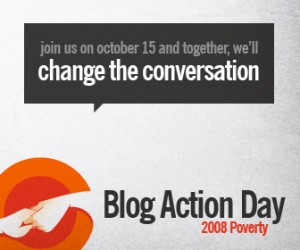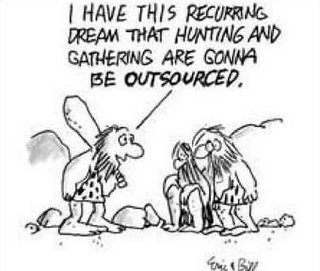 When I sat down to write this post for Blog Action Day 2008, I’ll be honest – I wasn’t sure what exactly I was going to say. Don’t get me wrong – I knew the reasons why I was participating and writing, and I knew roughly what I wanted to say. It was just… how could I convey a message against poverty from a social media viewpoint? And then it hit me – Blog Action Day 2008 and social media are intertwined because we’re all in this together.
When I sat down to write this post for Blog Action Day 2008, I’ll be honest – I wasn’t sure what exactly I was going to say. Don’t get me wrong – I knew the reasons why I was participating and writing, and I knew roughly what I wanted to say. It was just… how could I convey a message against poverty from a social media viewpoint? And then it hit me – Blog Action Day 2008 and social media are intertwined because we’re all in this together.
I don’t want that comment to come across as glib – that is the last thing I would ever do, or want to be thought as. When I say we’re all in this together, I mean that the social media medium is probably the ideal partner to the changes and issues that Blog Action Day 2008 is having us all discuss.
(For anyone who hasn’t heard about Blog Action Day 2008, it’s a special one-day event for bloggers around the world to stand up and speak out against world poverty).
Apart from the obvious connection of writing a blog post, there is so much more that social media can offer to begin the changes we need to put in place to make a difference. The figures alone from Blog Action Day 2008’s website bear testament to this – 10,723 blog owners (at time of writing this) writing posts on a single subject, with an expected readership of just over 11.5 million people.
But we shouldn’t stop there. There is so much more we can all do, and as a social media advocate there’s a lot that I feel our particular medium can do as well. One of the great things about social media is it gives everyone with an Internet connection a voice – and that’s a pretty powerful thing. If you want an example of how powerful, just look at how serious the US election candidates are taking social media and networking.
So what can we do with this voice, this collection of opinions and influence? The first thing to do is make sure that Blog Action Day (and the similarly themed Bloggers Unite initiative next month) isn’t just an annual event. We need to keep people informed as much as we can throughout the year; we need to make the people that have the power to make a change hear enough of us to do so.
For my part, this is what I will do from today:
- For every unique comment received on this post and every post between now and the end of the year, I will donate $0.10 to the Make Poverty History fund. Then, each year end from today, I will continue to donate $0.10 for every unique comment left.
- With every new project I take on at my PR agency, I will donate 5% of my fee to the fund.
- I will continue to make posts to keep awareness of poverty, its cause and effects via my blog and beyond
- I have a project that I have in mind regarding this subject, and will share with you all shortly and ask for support.
This is my personal donation to Blog Action Day 2008 and beyond. At the end of each year, I will let you know how much was donated. Yet as I said, we’re all in this together. Social media brings everyone together, so let’s open up our arms and bring in the poverty-stricken of the world into our network.
For your part, it’s entirely up to you what you wish to contribute. It may be a donation to a worthy cause like Make Poverty History. It may be that you offer pledges yourself for the comments on your blog. It may be something as simple as getting two cookies at the coffee shop and giving one to the next homeless person you see. After all, poverty affects each and every country.
Whatever you do, make sure you do something. It’s taken Blog Action Day 2008 to open up a lot of people’s eyes to what’s going on in the world. Let’s make sure that we never have to discuss poverty again, unless it’s with our politicians. In the meantime, let’s be grateful for programs like Blog Action Day 2008 and make our voices heard.
If you enjoyed this post, please consider leaving a comment and subscribe to my RSS feed or via email to ensure you can enjoy the latest post(s).











 If someone were to ask you what your brand is, how would you answer them? Would it be your slogan or tag-line? Your logo? Perhaps it’d be your product or service? Then again, maybe it’s your business’s direction. If the question doesn’t give you an immediate answer, don’t worry – you’re not alone.
If someone were to ask you what your brand is, how would you answer them? Would it be your slogan or tag-line? Your logo? Perhaps it’d be your product or service? Then again, maybe it’s your business’s direction. If the question doesn’t give you an immediate answer, don’t worry – you’re not alone.